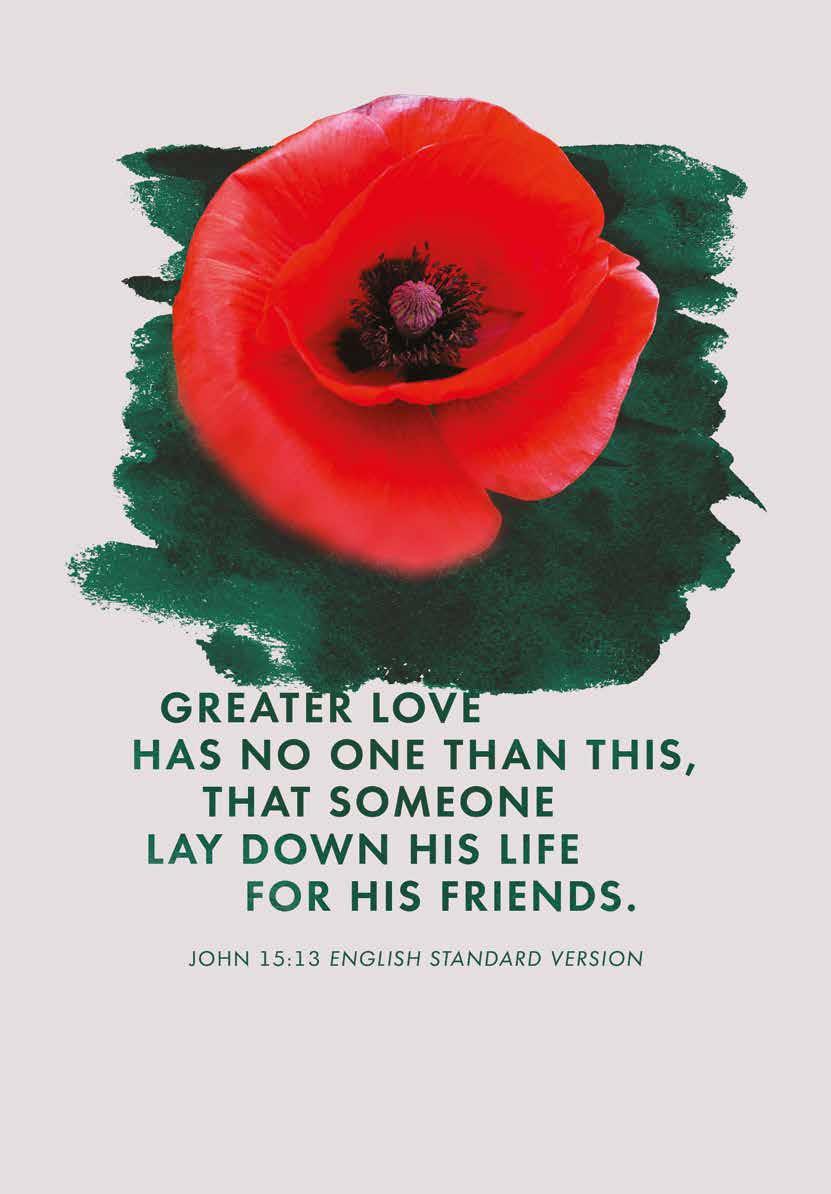SALVATIONIST
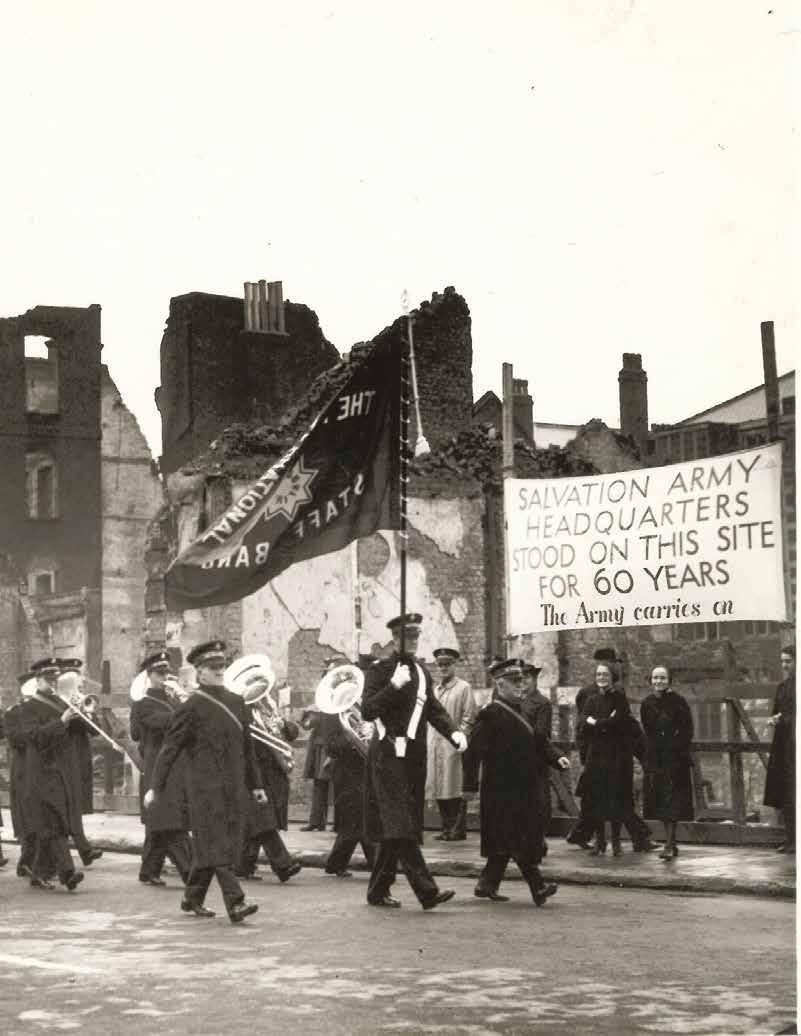
PERSEVERING IN SERVICE
REMEMBRANCE
SUNDAY


REMEMBRANCE
SUNDAY
FOR those familiar with musical theatre, the above three words will spark images of arguably the most impactful show created in living memory. This year marks the 40th anniversary of Les Misérables I have to confess that I have been privileged to watch the show at least half a dozen times within those 40 years and am yet to be disappointed or untouched by the power of the music and the story of grace, sacrifice and redemption that it portrays.
Having been given a second chance, Jean Valjean embarks on a life of giving back, no matter what the cost may be. Javert is the police officer who pursues the fugitive Valjean and, in a brief encounter with the reformed pillar of the community, glimpses a memory of the man he had once known.
Memories can be provocative, both positively and negatively. As we commemorate those who have given their lives in service on Remembrance Sunday (9 November), we are reminded once again of the sacrifice of others for our freedom and are perhaps also reminded of the price paid for our redemption by the grace of God and the sacrifice of his son.
Lest we forget!




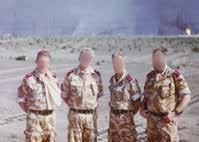
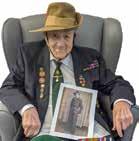

EDITOR Major Julian Watchorn
MANAGING EDITOR Ivan Radford
ASSISTANT EDITOR Stevie Hope
EDITORIAL ASSISTANTS Major Margaret Bovey, Major Lynne Shaw, George Tanton, Lyn Woods
SENIOR DESIGNER Hannah Holden
GRAPHIC DESIGNERS
Joseph Halliday, Louise Phillips
PROOFREADER Chris Horne
CONTACT US 020 7367 4890
salvationist@salvationarmy.org.uk
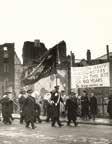
ADVERTISING advertising@salvationarmy.org.uk
DISTRIBUTION AND SUBSCRIPTIONS
Salvationist Publishing and Supplies (Periodicals), 66–78 Denington Road, Wellingborough NN8 2QH 01933 445445 / subscriptions@satcol.org
Version (Anglicised), unless otherwise stated
FOUNDERS Catherine and William Booth
INTERNATIONAL LEADERS
General Lyndon Buckingham and Commissioner Bronwyn Buckingham
TERRITORIAL LEADERS
Commissioners Jenine and Paul Main
EDITOR-IN-CHIEF Major Julian Watchorn
TERRITORIAL HEADQUARTERS
1 Champion Park, London SE5 8FJ 0845 634 0101
© The Salvation Army United Kingdom and Ireland Territory. ISSN 2516-5909.
The Salvation Army is a Christian church and registered charity. The charity number in England, Wales and Northern Ireland is 214779, in Scotland is SC009359 and in the Republic of Ireland is CHY6399.
weekly by The Salvation Army and printed on paper from sustainable sources by CKN Print, Northampton.

As the number of druglinked deaths increases, Chris Hartley calls us to join the Army’s campaign for a compassionate response

ADDICTION is complex and could affect any one of us. Our society often demonises people with drug addictions, viewing addiction as a moral failure or a lifestyle choice, while ignoring the fact that many people struggling with addiction are simply trying to cope with unimaginable trauma and suffering. Many individuals who sleep on the street use drugs or alcohol because it is the only way they can sleep, given the constant fear they must live with.
It is not for us to judge others, but to offer our hand in love and support. We should consider how Jesus lived. He rejected many of the social norms of his time that excluded people. He lived out his teachings by welcoming and comforting those who were outcast. He taught us that everyone is valued and loved by God and that, through him, everyone can find eternal life and freedom from suffering.
In Matthew 25:40, Jesus says: ‘Truly I tell you, whatever you did for one of the least of these brothers and sisters of mine, you did for me.’ For 160 years, The Salvation Army has supported people struggling with addiction for that reason – this message of support and compassion is at the heart of our faith. The Army’s Addictions Department and Core Recovery churches are two ways in which we ensure we are meeting people where they are and supporting them on
their road to recovery.
Every life has value and is loved by God. As such, the growing number of individuals dying as a result of drugs is deeply concerning. Figures from governments show that deaths have increased by 66 per cent in the last decade. This means that 18 people are dying every day.
Every life lost is a tragedy – they were someone’s family or friend. The rising number of drug-linked deaths is a growing crisis in our country. And a key factor exacerbating this crisis is the increase in synthetic opioids, such as fentanyl, which are significantly stronger than drugs such as heroin, but much cheaper to produce.
Synthetic opioids are now often mixed with other drugs, increasing the risk of an overdose, particularly if the individual is unaware of this mixture. Studies have shown that a very small amount of fentanyl can trigger an overdose.
The Salvation Army is calling on the UK government to declare this crisis a public health emergency. We hope that, in so doing, the human lives being lost will be put at the centre of the response – rather than judgement, we need action. Rather than exclusion, we need compassion.
As Jesus taught us, we live our faith through sharing his love with those society excludes. People are dying because they are unable to get the
support they need. This must end. How can you help? We have created a petition calling on the UK government to tackle this growing crisis with compassion. You can add your name to it at tsa.link/addiction-petition. At the end of November, we will deliver it to No 10 Downing Street. We hope that the prime minister will recognise the need for action.
We will also continue to campaign to tackle the stigma around addiction so that more people can get the support they need. If you’d like to find out more about this campaign, please contact us at countmein@salvationarmy.org.uk
Read Matthew 25:40 in different translations and compare the wording. What do you think is meant by the words ‘the least’?
Add your name to the petition at tsa.link/addiction-petition

CHRIS HARTLEY Public Affairs Officer



Saturday 21 Mar 2026
William Booth College
What is it?
A day to explore how we can help our children and young people to shape the world, rather than be shaped by it. Children and young people are exposed to a greater array of information and influences than ever before, often shaping a distorted sense of identity. This is not the life they are called to live. Under the theme Influenced, the 2026 Children and Youth Conference will explore how we – and the young people we serve – can be transformed from being influenced by algorithms, likes and follows, into Kingdom influencers who participate in the work of Jesus, speaking truth, pursuing justice and reshaping culture with passion and purpose.
Who is the event for?
Anyone working with children or young people in their corps, centre or community.
Why should you go?
While digital media undeniably shapes the lives of children and young people, it is still the real people around them who hold the greatest influence. As children and youth workers, our call is to listen, observe and point people towards Jehovah Shammah – the God who is present.
Book your place
Tickets cost £35 per person, and include a new resource, a book voucher and a buffet lunch. The first 100 tickets will be sold at a discounted price of £25 per person! For more information, including volunteer travel grants, visit salvationist.org.uk/cy-conferenceinfluenced or email events@ salvationarmy.org.uk
‘I feel closer to God’
Barbara Norrie (Hull Citadel) shares how she found space to spend time with God
AFEW months ago, our corps leaders decided to do a film night and we all enjoyed watching War Room. When I came away from the evening, I thought to myself, ‘Where can I have my private place to pray in quiet?’ I lived in a small flat where space was limited, but I set aside an area in a window alcove in my bedroom. My computer and printer were stashed away and verses and prayer requests went up! However, it didn’t seem to work too well – there was always something that distracted me.
So I prayed about my situation –and the Lord’s answer was to find me somewhere else to live. I turned the wonderful walk-in cupboard in my new living room into a prayer room where I can sit, with prayers and Bible verses on the wall and a tiny shelf with pen, paper, prayer books and Bible at the ready.
The first night I spent in there, I came out feeling at peace – I had been in there for well over an hour without realising it. The second night, I spent another good length of time and came out feeling that the Spirit was once again moving in me. I really felt his presence in the room.
Every day, I go into the room, sometimes only for a brief ‘good morning’ and a prayer for the day, sometimes longer. Every time, my first prayer is one of thanksgiving to the Lord for finding me such a wonderful place to live where I have the provision to spend time quietly away from distractions. This facility has enhanced my faith by giving me greater peace and confidence to testify without hesitation. The Bible verse Matthew 6:6 is one of the verses on my wall: ‘But when you pray, go into your room, close the door and pray to your Father, who is unseen. Then your Father, who sees what is done in secret, will reward you.’

I feel closer to God as a result. That is reward enough.
Have you got a testimony to share? We’d love to hear your faith story! Get in touch
salvationist@salvationarmy.org.uk.
George Tanton examines the perseverance of the Army despite the destruction

‘IHQ in ruins’ was the War Cry’s sombre headline on 31 May 1941.
On 10 May, an incendiary bomb had levelled London’s Queen Victoria Street during one of the heaviest aerial bombardments by the German Luftwaffe during its eight-month bombing campaign of mainland Great Britain.
The War Cry described the night of the bombing in terrifying detail: ‘The threatening drone of the bombers vibrated under the brilliant arch of stars. All night the moon looked down on a city beset with fires. The roar and rattle of defending guns … mingled with the deep thud and sickening crunch of exploding bombs… The fire came through the back of the Assurance buildings... The front of the Reliance Bank fell out. 101 was the last to go.’
The destruction of The Salvation Army’s International Headquarters, and National Headquarters immediately opposite, preluded a story of resolute determination against innumerable odds. Despite the loss of its centre for global mission, the Movement rallied to persevere with its mission.
In the immediate aftermath of the bombing, General George Carpenter and Chief of the Staff Commissioner Alfred Cunningham were provided hospitality at the Canadian War Services Hostel at 101 Southampton Row. The General addressed IHQ employees at the International Training College, where the IHQ flag was re-hoisted.
Messages of sympathy came in from the Baptist World Alliance and the Methodist London Mission, while the administration of the Army’s global operations was transferred to the International Training College


at Denmark Hill alongside the War Emergencies Department. Personnel from the Finance and Property Departments remained at Queen Victoria Street to salvage safes and storage boxes.
The editor of The Musician, whose offices were also destroyed in the flames, wrote in the 7 June 1941 issue: ‘Not the vestige of an office or its contents remains, and numbers of documents and records, inestimable in value, have been unfortunately lost... Men in overalls – bandsmen and songsters some of them – commenced to dig at the roof of the strong room, partly filled with boiling water and gas, and presently ledgers and papers, soddened and scorched, were brought into the daylight.’
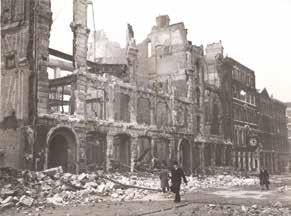

Despite the apparent hopelessness of the situation, the editor then reported: ‘Someone came along with a typewriter miraculously preserved, and then we departed, for the printers were waiting for the material for the next issue.’
General Carpenter shared this resolve and refused to be cowed.
‘We could, doubtless, be forgiven some sense of gloom at this serious interruption in our service to mankind,’ he was quoted in the War Cry, ‘but we find ourselves sustained by a great faith that the work to which we have devoted our lives will be carried forward triumphantly and without delay… We are rallying to continue our march for the salvation of mankind.’
The General immediately sought the means to rebuild IHQ, appealing to Salvationists worldwide to help fund the estimated £500,000 for a new building.
St Albans Corps was the first corps to respond, donating £101. The War Cry on 31 May 1941 stated that another early donation of £500 had been promised

from the Army in Malaya. Retired officers and Women’s Social officers also sent in gifts.
Eventually, half the estimated cost of reconstruction was compensated by the War Damage Act 1943. In 1963 the rebuilt IHQ was opened by Queen Elizabeth the Queen Mother.
‘Greatly as I value the pounds of the rich, I must confess I place very real store upon the pence of the poor,’ General Carpenter wrote in the 7 June 1941 War Cry. In the same article, he encouraged Salvationists to continue their vital work despite the destruction of 101 Queen Victoria Street.
‘Extraordinary tangles must be unravelled,’ he wrote. ‘The work of many years must be replaced. But our vital, frontline tasks, down amongst the people, for the people, bringing them to God, goes on today. IHQ is down. But we go on with the programme. There is work to be done, and we will do it.’

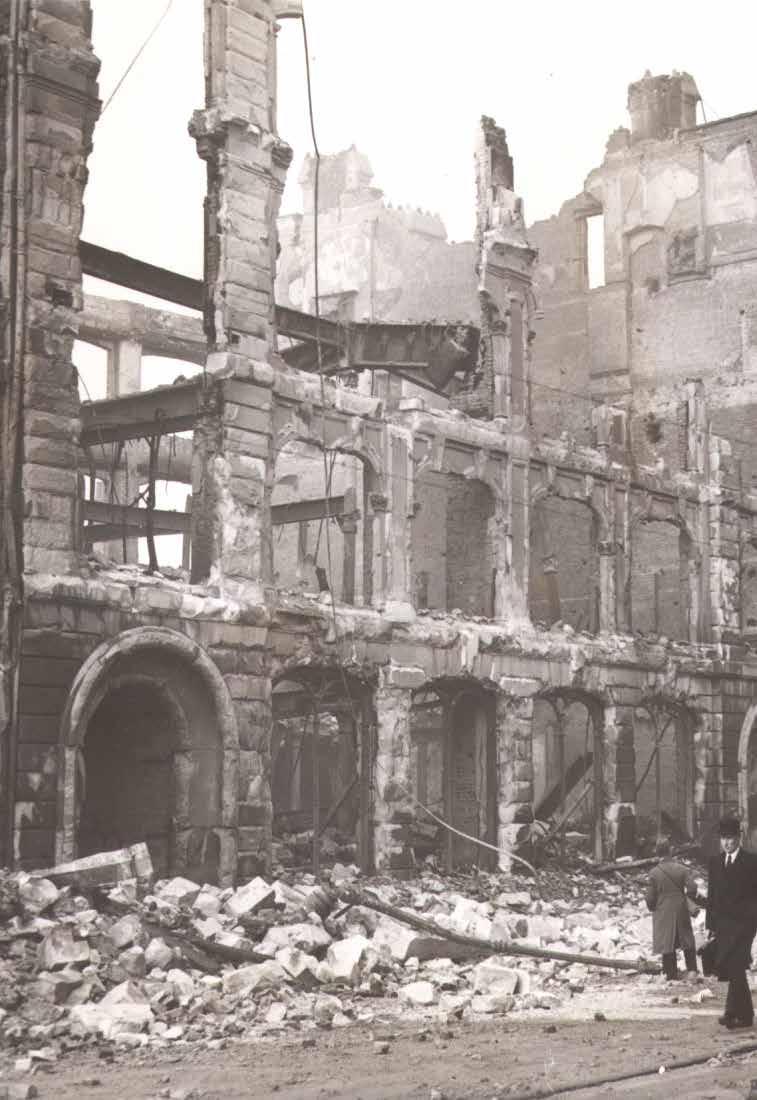
GEORGE TANTON Editorial Assistant Salvationist


IMAGINE for a moment that you want to write to fellow followers of Jesus to encourage them in their discipleship. You are aware, however, that they are in the midst of intense hardships and cruel treatment because of their faith and beliefs. What would you write? What message would you want to share? As we look at 1 Peter, we begin to find out what Peter chose to write to people in such circumstances.
Peter opens his letter by praising God for all that he has done in – and through – Jesus. He encourages his readers to join in with his rejoicing, despite the trials they currently face. Rejoicing in God’s salvation is Peter’s opening exhortation (see 1 Peter 1:3). In our study passage, Peter goes on to encourage his readers in their response to that salvation.
PAUSE AND REFLECT
How would you encourage followers of Jesus who are facing persecution for their faith?
In reading our study passage, three particular words caught my attention –revealed, hope and holy.
The word ‘revealed’ appears in verses 13 and 20. Each time, it refers to Jesus, but to different aspects of his revealing.
Verse 13 casts an eye into the future ‘when Jesus Christ is revealed at his coming’. This refers to the ultimate revealing of God’s love and grace for his people when Jesus returns.
In verse 20, Peter has Jesus’ earthly ministry in mind. The self-revelation of God in the person of Jesus was both
something that had already happened and something that would happen again. This was not just some convenient development of the Jesus story – it had been the divine plan since before the creation of the world. God’s salvation and grace, revealed through Jesus’ ministry –especially his death and resurrection –come to fruition at the final revealing, when Christ returns. Peter encourages his readers to try to see life through this lens, helping them look beyond their current sufferings.
How has God revealed himself to you over the past month?
In what situation are you praying for God to reveal himself?
That God has chosen to reveal himself to humanity gives great reason to have hope. Peter encourages believers to fix their hope on God; a hope generated in God’s promises and in Jesus’ real-world acts of power, love, compassion and authority. At the beginning of verse 13, the exhortation ‘with minds that are alert and fully sober’ – or, as the King James Version puts it, ‘gird up the loins of your mind’ –suggests a person preparing themselves for hard work, rolling up their sleeves as we might say today.
Peter encourages such determination of mind and spirit, with hope in God being the force that drives them. This is not passive discipleship. Rather, it is active discipleship. Hope in this biblical context is not a faint belief but a certainty. As Edmund Clowney writes in his commentary The Message of 1 Peter, hope
in God is ‘not so much an attitude to be cultivated as a reality to be recognised’.
In what do you place your hope?
To what extent are you an active or passive disciple of Jesus?
Peter calls us to live holy lives, because God, our source of hope, is holy. We could be forgiven for feeling daunted by the task of being holy as God is holy. Surely, that’s an impossible task! However, the command quoted from Leviticus 19:2 is not to be holy like God, but to be holy because God is holy.
God is holy, and Jesus is this holiness revealed. Therefore, Peter’s exhortation to be ‘holy in all you do’ (v15) should not be a case of reducing holy living to a series of right actions. Of course, our actions are important, but holy living begins in the mind, from which our actions flow. Living holy requires us to pattern and repattern our lives on the life of Jesus. This cannot leave our hearts untouched.
There is a complementary nature to practising holiness and the work of the Holy Spirit in transforming our hearts. The more we practise holiness through imitating Jesus, while at the same time allowing the Holy Spirit to work in our hearts, the more our lives become patterned by Jesus.
When talking about holiness, who do we think about? Do we think only of ourselves, or do we also think of the fellowship of which we are a part? Beginning with oneself is a good starting point, but holy living is not purely an individual task.


Peter is writing to communities of believers, encouraging them to play their individual parts in the endeavour of being a holy people. He encourages his audience to have deep love for one another ‘from the heart’ (v22). Is this not a reflection of the heart of God for his people?
Communities and fellowships made up of people who love one another deeply can reveal God’s love to the world around them. Even in the trials and struggles, Peter calls people to double down in their efforts to live holy lives and be holy communities.
How often do you pray for holiness in your life?
Do you consider holiness to be purely individual, or is it also a corporate endeavour?
How can we continue to commit to and grow in holiness as Salvation Army communities and fellowships?
God has revealed himself to his people – to us. This gives us a sure and certain hope for the future, when all things will be made right again. Therefore, our response is to live holy lives that reflect God’s goodness. In turn, our holiness becomes part of that continual revealing of God’s love for all his creation.

LIEUTENANT ELLIOT KERVIN Corps Leader Edinburgh Gorgie


A shortened version of Prayer Matters will continue to be published weekly in Salvationist in 2025. To read the full, unedited booklet, visit salvationist.org.uk/discipleship
SATURDAY 8 NOVEMBER: CARE FOR CREATION – COP30
Jesus died to reconcile the whole created order to himself. We are called, by that example, to be reconcilers with him. Help us, therefore, to overcome our differences and to seek justice for all, asking the vital question: How can I better honour my Creator and work towards a future where everyone can thrive? Unite us. Inspire us. by Major Heather Poxon (Territorial Environmental Officer)
SUNDAY 9 NOVEMBER: SABBATH PRAYER – REMEMBRANCE SUNDAY
The red petals of poppies speak of sacrifice in the past and present. Pray for all who are serving in conflicts around the world today. The black centre reminds us of those at the centre of world leadership. Pray for their hearts to be turned towards peacemaking. The green leaves suggest hope and new life. Pray for all who are working to help countries recover from war. by Major Jill Miller
MONDAY 10 NOVEMBER: SHARING THE GOOD NEWS – NORTH WEST AND ISLE OF MAN DIVISION
Pray for all those involved in shaping fresh approaches to mission across the division, particularly in Manchester, Liverpool and Salford. Pray that God will give them divine inspiration to re-energise Army work and meet diverse needs. by Major Steve Fripp (Divisional Mission Officer)
TUESDAY 11 NOVEMBER: SERVING AND CARING – NORTH WEST AND ISLE OF MAN DIVISION
Pray for the cluster groups that meet in the division. These are supportive communities where officers share, learn and grow in discipleship. Pray they will be safe, encouraging places for those who attend. Pray too for wisdom and discernment, as officers prepare mission-focused budget requests for frontline ministry and new opportunities. by Major Steve Fripp (Divisional Mission Officer)
WEDNESDAY 12 NOVEMBER: GROWING IN FAITH – THE LIFE PRAYER
I give my life to you to be filled with your life. Restore this frail branch in union with Jesus who is the Vine... I return myself to you – my body, soul and spirit, heart, mind and will… Encompass me and all that I am; well up within me. O Spring of Life, let your river flow through my heart, soul, mind and strength. excerpt from wildatheart.org/prayer
THURSDAY 13 NOVEMBER: INTERNATIONAL SALVATION ARMY – EASTERN EUROPE TERRITORY
We pray for those in Ukraine, Georgia, Moldova, Romania and Bulgaria, a Kingdomfocused, people-centred Army, committed to serving the whole person through worshipping communities, food assistance, winter aid and family support, humanitarian response, community development, and modern slavery response. We pray for the territorial leadership team: Colonels JP and Karin Ramos and LieutColonels David and Anna Kotrikadze. by Lyndall Bywater (UKI Boiler Room Team)
FRIDAY 14 NOVEMBER: JUSTICE AND RECONCILIATION – SA WORSHIP CONFERENCE God, we welcome you into our worship conference with open hearts. Come and make your presence known in a powerful way. Fill the place with your Spirit – bring healing, unity and a fresh hunger. Let every song, word and prayer glorify you. We long for an encounter, for lives to be changed and hearts awakened. by
Nik King (Music and Creative Arts)
PRAYER REQUESTS
Do you have something or someone you’d like us to pray for?
Email salvationist@salvationarmy.org.uk with ‘prayer request’ in the subject line.

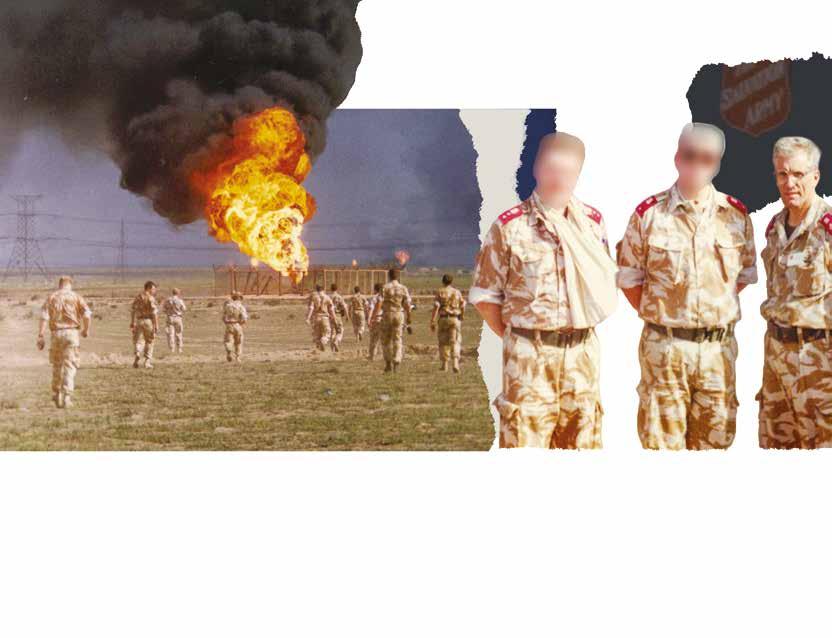
Lieut-Colonel Geoff Blurton talks to George Tanton about serving with the Red Shield Services during the Gulf
FOLLOWING Saddam Hussein’s invasion of Kuwait in August 1990, an international coalition of 42 countries, including the UK, went to war with Iraq. This conflict, known as the Gulf War, saw the biggest deployment of British servicemen since the Second World War. Alongside them were members of The Salvation Army’s Red Shield Services, providing both practical support and a listening ear.
The Salvation Army deployed a detachment of two mobile Red Shield canteens shortly before the commencement of the Allied ground offensive against Saddam’s forces.
Following the liberation of Kuwait, one mobile unit operated from February to March 1991 in Kuwait City and the other in Al Bubail, Saudi Arabia. A second detachment was stationed in the Gulf from April to May 1991. Lieut-Colonel Geoff Blurton, then a major, was in charge of the latter.
‘It was decided there should only be two deployments because of the potential danger to officers, and the fact
that we had other appointments in the UK,’ reminisces Geoff. ‘All eight of us were volunteers. There was certainly no pressure or arm-twisting for officers to go.’
For Geoff, the motivation came from his connections at Kettering Citadel, where he was corps leader at the time.
‘A young man at the corps was also in Her Majesty’s forces. He was sent out to the Gulf as a signals officer. That was the trigger to go in my case. I was also well aware of the first team that were already out there.’
Upon volunteering, Geoff and his colleagues were sent to RAF Brize Norton, Britain’s largest military aviation base. From there, they were flown out along with their mobile canteens.
Throughout his time in the Gulf, Geoff kept a handwritten journal, detailing every aspect of serving alongside the British forces stationed in Kuwait and Saudi Arabia.
‘I jotted down notes about the things that happened,’ he explains. ‘I included logistics, as well as my thoughts and feelings about the problems we
encountered. As the team leader, I was invited to the daily operational briefings by the commanding officer of the Royal Logistics Corps that we were attached to. We were very much involved with the military on a day-to-day basis. I knew what they were doing and even what they were thinking.’
Walking around camp in their desert camouflage military uniforms, Geoff reveals that he and his team were often mistakenly addressed as military officers by servicemen.
‘The embarrassing thing was that soldiers would want to salute us. We kept saying “we haven’t got the Queen’s Commission”,’ he jokes. Upon entering Kuwait, Saddam’s forces were in retreat and the work of the military involved mainly peacekeeping. However, Geoff and his team were still acutely aware that they had entered an active war zone:
‘We were walking around the desert, aware that the Iraqis had placed landmines everywhere. There was certainly an element of danger.’
Geoff’s team were involved in
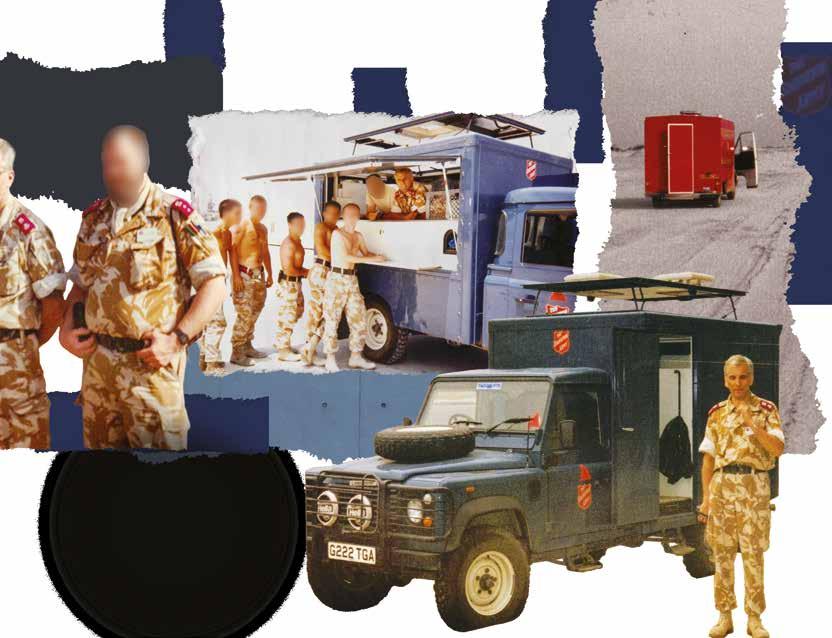
This article demonstrates the value of compassion.
I T Y For more, visit salvationist.org. uk/our-values or scan the QR code.

providing refreshments to British troops, as well as offering a listening ear and guidance in moral and spiritual matters.
‘There were lots of opportunities to talk to the soldiers about their fears or families,’ he explains. ‘There were some who wanted to discuss the politics of the war, others wanted to discuss the moral side. Even some of the senior officers were asking, “What are we doing here?” We were all things to all people; whatever they wanted to talk about, we would talk to them about it.’
In some cases, Geoff and his team supported British troops in more practical ways. Geoff remembers that a soldier, worried that his wife would not receive any flowers on their wedding anniversary, asked him to intervene.
‘She received a bunch of flowers, courtesy of The Salvation Army, delivered to her door by the local florist,’ he fondly relates.
‘There’s one interaction that always sticks with me,’ he continues. ‘A sergeant once said to me that that we brought normality to an abnormal situation.
I asked him what he meant by that. He explained: “Well, there’s nothing more normal than the Sally Army on the street corner. When you get out here into the desert, the last thing you expect to see is the Sally Army setting up a vehicle with crisps, filled rolls and Coca-Colas!”’
Geoff recalls the destruction caused by the war: ‘Sadly, we came across bodies. I don’t ever recall getting close to the fighting. Going into Kuwait from Saudi Arabia was a real eye-opener. There was such devastation caused there and vandalism. Buildings were in ruins and ransacked. We went past several car showrooms with lines of Mercedes all totally destroyed.’
Upon returning to the UK, Geoff admits that he struggled to acclimatise: ‘It was difficult to forget and I had constant reminders. Sometime after getting back, I was in a pub in Kettering. There was a young man, not in uniform, but standing to attention. He remembered me from the Gulf. “Good to see you sir!” he said to me.’
‘War is always a waste,’ Geoff laments. ‘It is a waste of muscle, a waste of
manpower, a waste of everything.’
Looking back upon his time in the Gulf, he reflects on the state of the world today, including the conflict in Ukraine.
‘It grieves me that in Kyiv there is such devastation going on,’ he observes.
Considering how humanity can rebuild after such devastation and bloodshed, he highlights the need for peace, friendship and fellowship above all: ‘Irrespective of what has gone on, and the rights and wrongs, in the end I suppose those things don’t matter when you are picking up the pieces at the end of a war.’
• Pray for peace, lament conflict, and cry out to God for a transformation of hearts with the new Praying for Peace resources at salvationist.org.uk/praying-for-peace

GEORGE TANTON Editorial Assistant Salvationist
As he celebrates his 100th birthday, Vic Stone shares how The Salvation Army has supported him through war and peace
VIC Stone was welcomed as an adherent at Sheerness Corps last year. A Burma Star recipient, the centenarian remembers that the Army was present in his early childhood after the death of his father.
‘I grew up at a time when it was accepted that children were seen but not heard,’ Vic relates. ‘I wouldn’t say a word to anybody. I didn’t speak unless I was spoken to. One Sunday afternoon, my mother told me to get my coat on and away we went. We turned right at the corner of our street and there was the Salvation Army hall.
“ After all these years, during the war in particular, the Army has helped and guided me. ”
‘My mother spoke to the officer in charge, who welcomed me, and I became a regular, and was enrolled as a junior soldier. Somewhere in my loft is my attendance card with all the blue stamps on it!’
Vic fondly reminisces how he found comfort at the Army: ‘At school I was always bullied, but at the Army the atmosphere made me feel comfortable and happy. People would put their arm
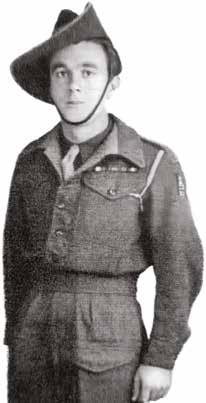
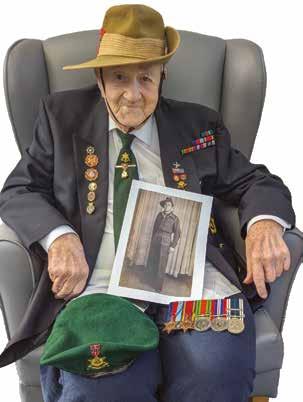
around you if you were upset.
‘I have an idea that the Army helped my mum find a new flat in Fulham. As we had both been born there, we moved back home. My life also picked up; I made friends at school and was in the local football team.’
After being evacuated from London to Guildford because of the Blitz, in 1944 Vic was called up for military service and sent to Burma. At the time Burma was a British colony. In December 1941 it had been invaded by the Japanese Empire, one of the Axis powers, forcing the British into retreat to India. In early 1945, after several attempts, British and Allied forces managed to re-enter Burma. Despite being shipwrecked in a terrible storm during his training, Vic was not deterred. Following their training, his motorboat unit was part of a supply route transporting equipment back and forth along the Chindwin and Irrawaddy Rivers to aid in the recapture of Mandalay.
Before his enlistment, Vic knew little about Burma and the Japanese troops.
‘In battle, they would line up in their hundreds and make a dash, screaming and brandishing a sword or a bayoneted rifle,’ he recalls. ‘All our chaps could do was sit on the ground with a Bren gun and shoot back. They lost so many men.’
Following a trip back to Calcutta to collect more boats for the planned invasion of Rangoon, The Salvation
Army once more appeared in Vic’s life at Rangoon harbour: ‘We came off a troopship and formed up into a column to march away. Suddenly we heard some English voices shouting. We realised it was a chap and two ladies with a Salvation Army tea wagon. They were shouting and dancing up and down, waving teacups.’
He chuckles: ‘Unfortunately, our sergeant-major screamed: “Orders are orders, keep marching!”’
Vic’s unit was billeted in an old iron foundry and the same Salvation Army tea wagon made the effort to follow the troop column to give Vic and his comrades a cup of tea.
‘They had come and found us,’ he smiles. ‘We had free cups of tea and free packets of biscuits. It was wonderful!’
After being demobbed in 1947, Vic married and had a family. The Salvation Army continued to be in his life, supporting his family when his daughter went missing and successfully locating her through the Family Tracing Service. On Remembrance Sunday last year, Vic was welcomed as an adherent after being inspired by the testimony of his friend, Steve.
‘I was standing behind Steve listening to what he was saying,’ Vic testifies. ‘It’s as if there was a presence in the air, and it suddenly hit me: “This is for me.” After all these years, during the war in particular, the Army has helped and guided me.’
Tanzania
Captains Benjamin and Rebecka Cotterill
Eastern Europe
Captain Annmarie Gifford
Uganda
Majors David and Janet Howarth
Colonels Joao-Paulo and Karin Ramos
Switzerland, Austria and Hungary
Singapore, Malaysia, Myanmar and Thailand
Colonels Ann and Richard Borrett
Brazil
Christiaan Bijl and Stephanie Chagas-Bijl
Germany, Lithuania and Poland
Majors Christopher and Liesl Baldwin
Major Philippa Chagas
Colonels Dean and Eirwen Pallant
Netherlands, Czech Republic and Slovakia
David Kozáček and Michaela Kozáčková
Major Mark Cotterill
Captain Annmarie Gifford
Majors David and Janet Howarth
Colonels Dean and Eirwen Pallant
Majors Melanie and Steven Smith
USA Eastern
Majors Leanne and Martin Cordner
Sweden and Latvia
Major Mark Cotterill

Some of these details may change. Please contact the Overseas Services Unit at Avalon for confirmation.
This list does not include UK and Ireland personnel appointed to IHQ.
Majors Melanie and Steven Smith
Salvationist
outlines six ways the Christmas specials of Kids Alive! and War Cry can help you
AS Advent approaches, corps across the territory are starting to plan how they can spread the good news this Christmas. From carol services to food and present parcels, Salvationists will be living out the gospel through community engagement and outreach. Whatever your ministry looks like, the Christmas editions of Kids Alive! and War Cry will be there to help you spread the good news.
The 29 November editions of the weekly magazines will be packed with features, games and stories to remind people of the real meaning of Christmas. With no date on the cover, these missional resources are designed to be used throughout the whole Christmas season.
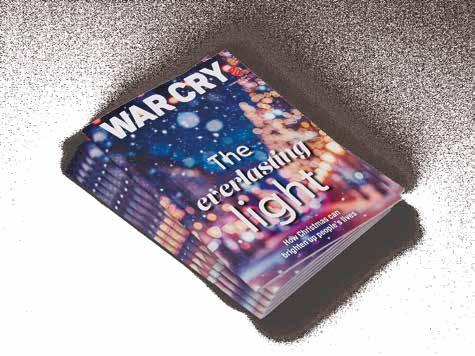

Here are six ways the Christmas specials can help you in your ministry:
1 A welcome present
Whether you’re carolling on the high street or hosting a warm space, you’ll be meeting people this Christmas who might not usually attend your corps. From friends and family to visitors from the local area, a copy of War Cry or Kids Alive! can provide a lasting welcome they can take away, keep and share throughout the Christmas season – and because the issues have no date, they are timeless resources to use at any point.
2 A handy conversation-starter
Let’s be honest: outreach can be hard work at the busiest of times. During carolling and other external engagements, why not take copies of Kids Alive! or War Cry with you? Already written to be as accessible as possible, any one of their inspiring stories or funny jokes is a handy conversation-starter!
Christmas is a time for community and saying thank you to all those who are part of yours – the regulars who attend your weekly programme, the groups that hire your hall or the people who donate to your present appeal or food bank. Expressing your gratitude can be as easy as giving them a magazine or comic to curl up with – a reminder of the real meaning of Christmas shows them how much they mean to you and to God.
4 A way to share joy at schools and children’s groups
Who says sharing a Christmas giggle only happens when you pull a cracker? Giving a supply of Kids Alive! to a local school, especially if they’ve donated toys to your appeal, can help spread Christmas cheer far and wide. If you run a parent-and-toddler, brownies, Babysong, Dance Fit Tots or other YP group, the Christmas Kids Alive! special is packed with materials to keep the joy of the Christmas story going – and you don’t have to prepare any of it!
5 Added hope to your parcels
Food parcels or present parcels will be central to Christmas work for many corps across the territory, as they seek to help people who are struggling to
Do you have enough copies?
To add copies of War Cry or Kids Alive! to your usual weekly order, or to order copies for the first time, email subscriptions@satcol.org or call 01933 445 445.
Orders must be received by Thursday 13 November at the latest.
make ends meet. Including a copy of War Cry – or Kids Alive! for families with children – can add some extra kindness to each package by providing additional comfort, entertainment and hope – without them feeling embarrassed about it.
6 A source of funds
When you sell War Cry or Kids Alive! on the street, did you know you’re also helping to raise funds for your corps? Each copy of the Christmas special is available to corps selling to the public at the regular price of 25p for Kids Alive! and 20p for War Cry. With a cover price of 50p each, that means your corps benefits from additional funds every time you sell a copy – a gift that makes sure your corps can keep on giving to your community in the future.
Salvationist highlights community and fundraising resources to help your corps or centre this Christmas
CHRISTMAS is a time when we celebrate God’s love coming down to the world – and, as we prepare to celebrate the good news of Jesus’ birth, we are called to share that love with others – a love that reaches out, wraps around, stands with us and always shows up. How we show that love will look different for each of us, depending on the local needs in your community. You may be operating a food bank, carolling in the high street, leading school assemblies, hosting a community meal or distributing Christmas presents.
public eye, make the most of the available resources to make a positive difference in your community this Christmas – and help ensure that the Army can keep shining a light and making a difference well into the new year.

The resources you have to do these things will also vary – but THQ’s range of Be a Star! resources is available to download from tsa.link/BeaStar and can help support your work. They’re also stuffed with tools to help raise funds to support The Salvation Army’s work, including a guide on how to use JustGiving, with tips on personalising your corps JustGiving page and setting up a QR code, plus donation cards and posters to help encourage people to give generously.
At this busy time of year, when The Salvation Army is so prominent in the
A full fundraising pack, including ideas and tips on fundraising at Christmas. These include editable donation cards, collection tin wrap, ideas to inspire your community Christmas activities, and examples of the impact that people’s donations can have.
This resource features a collection of ideas, resources and guidance for planning your community Christmas meals. As well as a timetable, editable guest form and invitation template, it includes befriending tips and inclusion guidance from the Enabled team.
Follow these simple steps to help increase the donations that come through on your JustGiving page. For more information or assistance, email challenge@salvationarmy.org.uk.
1. Make it personal
Inspire supporters with details of what you are doing, such as photos of your preparations.
2. Update your corps webpage
Including your JustGiving link on your salvationarmy.org.uk page will help to make it discoverable.
3. Share it on social media
Don’t forget to tell people that they can support you on your Facebook and social media page.
4. Create a QR code
Help people to get straight to your fundraising page while they’re on the go.

Every year, thousands of families across the territory are helped by corps and centres who hold a Christmas Present Appeal, which provides gifts to children who might otherwise miss out on Christmas Day. If you are hosting an appeal, all the promotional resources you need are available to download, from posters and QR codes to postcards and toolkits.

5. Say thank you
Publicly thanking your donors and letting them know what a difference their support has made will not only build good relationships but also prompt others to donate.
IN July, The Salvation Army announced that it would transition from running 11 residential care homes for older people to grow its community-based support programmes. Following three months of consultation and research, negotiations are under way for alternative providers to take over the running of nine of these homes.
Sadly, no alternative buyer could be found for Davidson House or The Hawthorns, which means that these care homes will close once alternative accommodation is found for the remaining residents.
Director of Older People’s Services Glenda Roberts (THQ) said: ‘Our focus now is to settle every single resident of Davidson House and The Hawthorns into new accommodation and these homes will not close until alternative placements have been found.
‘We understand that this is still distressing news. We are doing everything we can to support all those affected by this process and have set up a dedicated team to help ensure a smooth transition.
‘Closing a home is a last resort and it is not a decision we have taken lightly. We very carefully considered all the feedback we received during the consultation period and explored the possibility of selling to alternative providers, but we were unable to resolve the significant financial and clinical challenges faced by these two homes.
‘The biggest challenge is an ageing society. Residents are joining us later in life, which means they often have more complex needs. It would take many millions of pounds to change our staffing, governance and expertise to be able to offer the specialised nursing required and to adapt our buildings. Other care home providers are better placed to meet the complex and changing clinical needs of older people, which is reflected in the considerable industry interest in nine of our homes.
‘It’s important to stress that Davidson House and The Hawthorns are places of great love and care, and the fact that we could not find a potential buyer for these homes reflects the challenges faced by the care sector as a whole, as well as the local market.’
Until contracts are exchanged, the Army cannot say for certain that the remaining nine homes will transfer to other providers. It is hoped that the process will be completed by early 2026.
Glenda continued: ‘When considering alternative providers, we have not just been considering the commercial value of the sale but exploring an organisation’s values and ethics. We only want to transfer ownership to companies that plan to continue the work we have started in providing care that is rooted in love and will ensure that residents’ spiritual needs are met.
‘Every week, about 3,500 older people attend Salvation Army community activities, ranging from lunch clubs to specialist dementia services, and our plan is to substantially increase that vital support. By building on our community foundation, we can reach deeper into communities and support more vulnerable older people.’ – AR
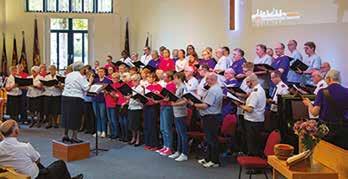
SHEFFIELD CITADEL Birmingham Citadel Songsters brought a weekend filled with music-making and ministry, supported by the newly formed young people’s band. On Saturday evening, more than 120 people enjoyed a concert that included ‘Be Still, My Soul’, ‘Written in Red’ and ‘O Love’. The YP band played four pieces and accompanied a congregational song. On Sunday, a group of songsters led worship at Wombwell with Barnsley Corps while the remainder led the meeting at Sheffield Citadel. After sharing fellowship over lunch, the songsters rounded off the weekend with a relaxed praise concert, culminating in them joining with their host corps counterparts for two pieces. – JC

were present during the Belfast half marathon to encourage the 8,000 runners passing the building. Salvation Army literature was distributed, along with hot drinks for spectators and oranges and water for runners. – EW
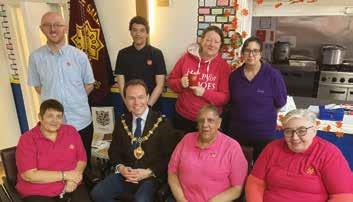
NOTTING HILL The mayor of Kensington and Chelsea, Councillor Tom Bennett, visited to share some time at the Sanctuary Café. He spoke to people about his role and gave opportunity for questions. He latterly met with corps leadership for an in-depth conversation around the mission and ministry of the corps and the national and international Salvation Army. He is pictured with members of the team. – AR
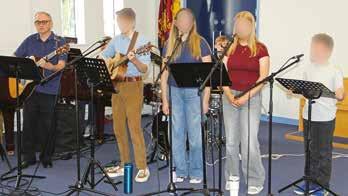
LEIGH-ON-SEA Café church gave opportunity for discussion over refreshments. This included a review of the past year regarding the proposed corps mission, where the corps has progressed and where it is going. One outcome has been the formation of a worship group, and this was the first opportunity to present it to the congregation. – PJ

HADLEIGH TEMPLE
The East of England Youth Band and Chorus led a weekend of worship, teaching and fun. A Raise training session for youth workers from local corps kicked off Saturday. After lunch, a Connect session saw open rehearsals, games, fun and preparation for the evening concert, which featured the band, singers, timbrelists and testimonies. The young people enjoyed fellowship over pizza before sleeping over at the hall and leading morning worship. The weekend finished with a visit to Hadleigh Farm Estate. The young people were inspirational and led uplifting worship. Everyone had a great time! – MC
CLOWNE A team led by soldiers Chris Hockley and Val McCall hosted a coffee morning and sale that raised more than £1,000 for Macmillan Cancer Support. The event was blessed by many attendees from the corps and community and donations of cakes and other items. The home fellowship made the event their weekly meeting. – GH
LEIGH-ON-SEA The corps hosted the charity Dentaid, a mobile dentist surgery, on their recent visit to the area. Dentaid provides free dental treatment to people who cannot find a dentist or get to the dentist. It is hoped this will be a longstanding partnership. – RD
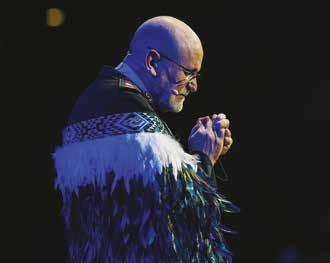
THE territory gathered in Kirikiriroa, New Zealand, for the Together Congress 2025, which opened with a deeply moving pōwhiri – a traditional Māori ceremony of welcome – honouring the presence of General Lyndon Buckingham and World President of Women’s Ministries Commissioner Bronwyn Buckingham.
Throughout the congress, delegations brought vibrant energy that enriched every moment. From powerful Pacific songs to traditional attire and heartfelt testimonies, their presence reminded everyone of the beauty and strength found in the territory’s diversity.
The international leaders delivered stirring messages that reverberated across the territory, igniting hearts with renewed purpose. Their call was unmistakable and urgent: ‘We are commissioned to be salt and light in a world aching for healing and hungry for hope.’
It was acknowledged that the UK and Ireland Territory also had a gathering named Together, which was a reminder that the work of transformation is not isolated, but collective.
The Together Festival added a celebratory dimension to the weekend, with food trucks, live music, pop-up markets and family-friendly activities welcoming the wider Hamilton community into the congress experience.
The weekend was a powerful celebration of unity, cultural richness and spiritual renewal, with delegates from the four nations experiencing shared worship and mission fellowship. – VH
FOREST OF DEAN The corps offered a gentle, supportive space for bereaved parents and families at its annual Life Remembered baby loss service. The event provides a crucial opportunity for reflection and remembrance, including a time of silence, candle lighting and thoughtful words. Each family receives a keepsake gift in acknowledgement of their loss and is invited to spend time at a special memorial tree, planted as a permanent place of remembrance. – AR
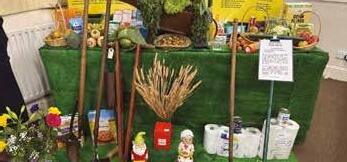
WIMBORNE An impressive and thoughtful display was arranged by Peter Keeping for Harvest Sunday. Major Ian Urmston (Weymouth with Portland) brought along a small ensemble from Weymouth Corps to lead the meeting. After, the produce was taken to a local charity. – CS
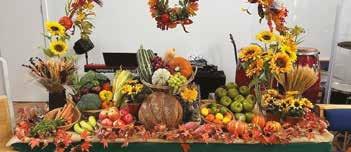
STAPLE HILL Special guest for Harvest Weekend was Divisional Mission Officer Captain Mhairi Smeaton. Events commenced with a supper and quiz night enjoyed by about 100 people. Gifts of produce were presented during worship, which will be used by the corps food bank to support many families in the area. In the morning service, Captain Mhairi spoke on The True Vine. – VW
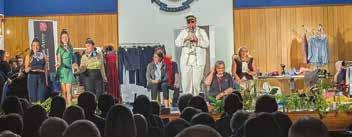
SUNDERLAND MILLFIELD The corps partnered Sunderland Monkwearmouth to host the musical Belongings for its final performance in the city. A large and appreciative audience gathered for the spectacular evening, which went out on a high note. The weekend continued with a Harvest festival on Sunday, led by Major Stephen Moir (Mitcham), who spoke on the importance of rooting our identity in Christ. The Harvest celebration included a time of giving, in which food was collected for the food bank run by Austin House Family Centre and clothing for the work undertaken in Durham at Sanctuary 21. – JD
PENARTH Harvest weekend started on Saturday evening with a fish-and-chip supper followed by a quiz. On Sunday morning, Divisional Mission Officers Majors Steve and Kim Wilson led the meeting. People were asked to bring something that reflects what they do during the week, and items included a Girlguiding badge, a washing up bowl, knitting needles, a music score and a diary and pen. They reminded us that God can use even the simplest of things. – CP
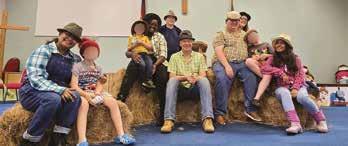
SALISBURY As part of its family-focused Messy Church, the corps gave the hall a farmyard feel, with straw bales and a scarecrow giving families – including 38 people new to the corps – opportunities to participate. Themed around the Parable of the Sower, activities included planting seeds, blowing bubble prayers of kindness to God, bread tasting and fishing for blessings, and concluded with a Harvest feast. This was the first Messy Church event hosted by the corps in many years, and more are planned. – MD
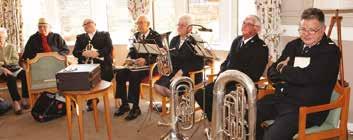
CLOWNE Members of the band shared an afternoon Harvest festival with more than 30 residents of the Holmewood Care Home. Bandmaster Dean Coates led a traditional service, and a good time was had by all. – GH

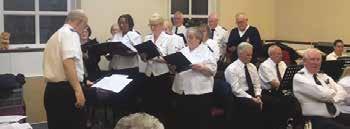
RHOSLLANERCHRUGOG Rhyl Songsters supported the Harvest weekend, with a band comprising members from Rhos and Coedpoeth Corps and friends. The music brought the sweetness and inspiration of the hills into our hall, lifting our sights from the mundane to the heavenly, encouraging us on our Christian pilgrimages. The songsters’ repertoire included ‘Trust in Jesus’, ‘How Can I Keep from Singing?’ and ‘All My Songs of Worship’. The band lifted us with ‘The Joy-Bringer’, ‘Myfanwy’ and ‘Shekinah’. Major Sue Collins also added a concluding word and a reading from Colossians 3. – JH

AUDREY Hinks was born in Pontefract and entered the Servants of Christ session at the age of 19 in 1961. After several years on missionary service in Ghana, Audrey returned to her home corps to look after her aged parents. She married Stan Briggs and, although she had no children of her own, Audrey brought up his children and was a devoted Auntie Audrey to her sisters’ children. In later years Audrey took on full-time responsibility for the corps and became an avid fundraiser, organising twice-weekly coffee mornings and café church events, market stalls and collections in supermarkets, helping to raise thousands of pounds for the Army over the years. – AE
Please note members’ tributes submitted for publication should be no longer than 150 words.

JEAN was born into a Salvation Army family in Clacton in 1932. She grew up at Clacton-onSea Corps, with a short period at Brightlingsea when evacuated there during the Second World War.
Jean became a junior soldier and singing company member and, in her teens, was a delegate at the 1950 International Youth Congress. She was active in the songsters for more than 60 years, often featuring as a soloist, and served as singing company leader. Jean and her late husband, Tom, were always an encouragement to those around them. During the 1990s, Jean was appointed as project manager for the Salvation Army Housing Association, often going beyond the call of duty to help her residents.
Jean’s life was a life of service to her Lord. This service continued as she witnessed her faith to staff and patients while in hospital before her promotion to Glory. – VR

CHRISTINE was born in Folkestone to Salvationists Alan and Helen Crafter in 1949. She attended teacher training college and taught at local schools. Christine met and married Peter Pilgrim in 1980. They soldiered together at Folkestone and became singing company and young people’s band leader respectively. Christine was known for her accomplished and sensitive musical ability. She led the singing company – a 40-strong group of young people – which went from strength to strength. Due to Pete’s work, they moved to Bexhill-on-Sea in 2006, attending Eastbourne Citadel. Christine continued to use her musical abilities for the corps, enjoying the fellowship there.
Christine was an inspirational Christian leader, an encourager and an example of Christian love and kindness to numerous children and adults, encouraging them to follow their dreams. Many people say she was a solid influence and positive part of making them who they are today. – VW
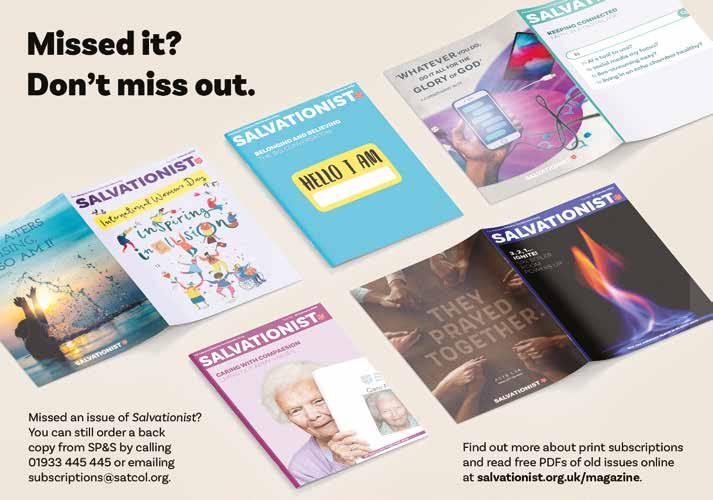
Territorial Leaders Commissioners Jenine and Paul Main Sun 9 Nov The Cenotaph, Whitehall (Remembrance Sunday)
Chief Secretary Colonel Peter Forrest and Territorial Secretary for Leader Development Colonel Julie Forrest Sun 9 Nov The Cenotaph, Whitehall (Remembrance Sunday) Mon 17 Nov William Booth College (Together in Worship) Sat 22 Nov – Sun 23 Nov Morley
Conflict surrounds us – on our screens, in our communities and even in our closest relationships. This new resource is designed to create space for hearts to acknowledge the pain of conflict and respond through prayer, whether during a Remembrance service or at any other time. Visit tsa.link/prayingforpeace
Salvationist is bringing back Poetry Corner throughout the year to explore each of the territory’s five mission priorities: share the good news, care for creation, nurture disciples of Jesus, serve others without discrimination, and seek justice and reconciliation. If you have a poem about or inspired by seeking justice and reconciliation, please send it to salvationist@salvationarmy.org.uk for consideration by 21 November.
The Salvation Army is once again partnering The Entertainer to collect gifts for children who need them most. Until 29 November, customers can donate a toy in-store or online and, for every toy donated, The Entertainer will donate another. Each store is linked with a corps, which will distribute the toys through the Christmas Present Appeal. If you have any questions, email entertainertoyappeal@salvationarmy.org.uk
Get ready for your Christmas fundraising and community outreach with the Be a Star resources. They include editable donation cards and collection tin wrap, ideas and materials for planning community meals, and Christmas Present Appeal resources. Download them at salvationist.org.uk/resources/christmas
This new video-based resource from Sports Mission helps people explore how faith, sport and community can come together in transformative ways. Through inspiring stories, practical teaching and ready-to-use discussion materials, One Body helps lead people into a deeper understanding of what it means to live a church-without-walls life through physical activity. One Body is more than a resource –it’s a way for people to discover that Jesus isn’t confined to four walls. Download it at tsa.link/onebody
Join Salvationists across the territory in worship, with music, prayer and a Bible message from a guest speaker. This week’s Sunday Worship begins at the earlier time of 10.45am, as Captain Paul Williams (Felixstowe) shares a Remembrance Sunday message. Can’t join us on Sundays? Catch up with the weekly podcast of highlights. Each week’s broadcast is repeated in full on Sundays at 6pm, Mondays at 12am and Thursdays at 9am.
• Listen online at salvationist.org.uk/radio
Get your day started with half an hour of music, prayer, a thought and lots of giggles! Listen on Saturdays from 7.30am to 8am. Can’t tune in on Saturday morning? The broadcast is repeated in full on Sundays at 9am and Mondays at 7.30am.
• Listen online at salvationist.org.uk/radio
Ease into the day with a relaxed mix of music, chat and a few inspirational moments to stir your soul. Listen from 7am to 9am on Sundays.
• Listen online at salvationist.org.uk/radio
In the latest instalment of the Music Editorial team’s podcast, Andrew Justice – former principal trombone of the International Staff Band – talks to host Matthew Frost and current principal trombone of the ISB, Jonathan Evans, begins an in-depth look at ‘At the Edge of Time’. Richard Whitmore is the newest inhabitant of Arid Island, but what one album will he choose to pack?
• Listen online at salvationist.org.uk/podcasts
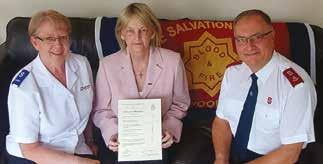
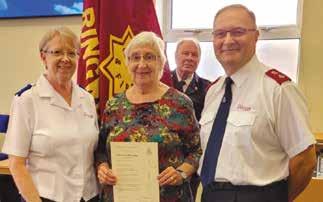
IT was wonderful to welcome two new adherents. Corps leader Major Emanuele Carpagnano, with his wife, Liz, went to the home of Helen Brew to welcome her as an adherent. Helen has been part of our corps family for two and a half years and felt this was the right time to make this commitment. Unfortunately, she was not able to be present at the corps due to poor health. Her friend, Gillian Lee, was welcomed three days later. Both friends testified to their strong faith in the Lord, and thanked the congregation for their love and prayer support. Helen recorded a very moving testimony to be played after Gillian’s welcome. The Lord blessed these two occasions immensely. – EC
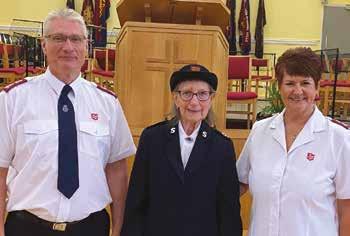
Lees was enrolled as a soldier by corps leaders Majors Julia and Robert Jepson after responding to the clear voice of God. Her faith has grown stronger and more vibrant over recent years, and she has found Jesus to be her strength and support. – RJ
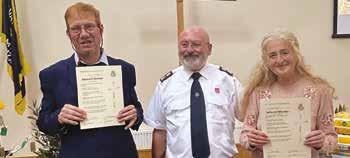
NEIL Oats and Suzette Reed were welcomed as adherents by corps leader Major David Tidball as the corps gathered to celebrate Harvest. Neil and Suzette have been connected to the corps for three years and attend a community group at the hall. Neil has been attending our Core Recovery breakfast and worship. Suzette has been leading a poetry and creative writing group. They both felt called to belong to the Army and wanted to commit in a public way. They are very welcome as part of our church family. – ST
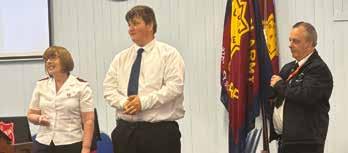
ADAM Mason was welcomed as an adherent by Divisional Area Officer Major Linda Govier. Adam is a committed member of our corps and made the decision to become an adherent a while ago. He is a member of the band, timbrel group and songsters. – JY
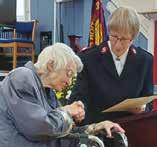
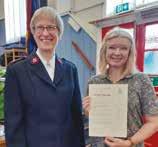
KATIE Newson and Rosemary King were welcomed as adherents by corps leader Major Mandy Sands. Katie has always lived in the immediate area of the hall and attended primary school in the adjacent street. She often passed by the hall and occasionally stopped to listen to the band but never entered. On one such occasion, soldier June Murdock invited her in, assuring her she was welcome. Katie has been attending ever since. Rose came with her partner via our Open House, and she began attending meetings. Rose expressed how she felt the warmth of the corps in their kindness and acceptance. She has found it to be a place of unquestioning compassion. – LH
